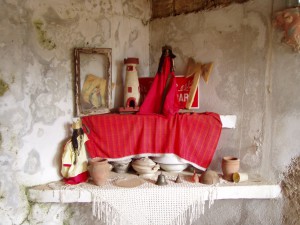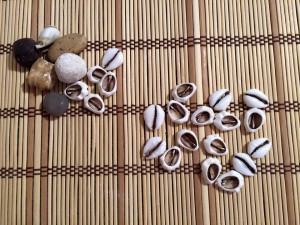Eleda.Org and Oloshas United, Miami Join Efforts and Invite you to our First Pilgrimage to Cuba:
Africa in Cuba, 2016
March 2016

Cabildo Terán, Jovellanos, Cuba
It is undeniable that Cuba, the largest of the Caribbean islands, is one of the region’s most culturally complex countries. The best of two continents came together–some freely, and others, lamentably, by force–and under its hot, tropical sun, molded a nation and a society that many deem among the most unique in the Caribbean. Cuban culture was born from seeds transported by Europeans, but planted by Africans. Her blood is mixed, like her people. Her heart beats to the rhythm of Spanish guitars and African drums; however, there is little doubt that no matter Europe’s might, Cuba’s soul and its vibrancy is Congo, Yoruba, Carabalí, Gangá, because Africa laid the seeds that sprouted in her soil. A national dish clearly illustrates Cuba’s heritage: moros y cristianos (Moors and Christians, blacks and whites)—black beans and white rice, skillfully cooked together so that each element permeates the other, while retaining its distinct identity.
Join us as we travel through Havana and Matanzas, two of Cuba’s most important centers of African Culture, where we shall reconnect with the island’s African past. Like a plate of moros y cristianos, this amazing journey will allow us to blend in and bond with the island’s captivating Africanity. Visit the Afro-Cuban cabildos or cult houses, many dating to the nineteenth century and feel the energy of its founders resonating within their walls. Experience the numerous African drumming traditions and their historical trajectories, allowing them to reverberate through your soul as they replicate millenary rhythms and respond to chants and prayers that alleviated the pain felt by those who sang them yearning to return home. Meet descendants of the Lukumí (Yoruba), Abakuá (Igbo, Kalabari), Congo, Arará (Ewé-Fon), and other African peoples whose ancestors arrived to the island’s shores in massive numbers, and refused to give up their humanity, identity, and sense of being, despite the acculturative attempts to eradicate a culture that refused to acquiesce. Join us as we embrace the soul of Africa in Cuba.
Our tour will include:
Airfare: Miami-Havana-Miami
Transfers to and from Havana’s José Martí International Airport, as well as all transfers to the rural towns and religious centers
Lodging in Hostals (bed and breakfast) or hotels in Matanzas and Havana
Some meals, including a welcome dinner at Matanzas El Chiquirrín restaurant
Visits to cabildos in Matanzas, Jovellanos, and Perico, and interviews with their directors
An evening drum festival where we shall listen to the beat of approximately ten African drumming traditions that are still active in Cuba
Demonstrations of Afro-Cuban ritual dances and singing
Visit to the San Severino Castle and Museum
Visit to Bacunayagua and the stunning Yumurí Valley
Visit to the Guamá forest reserve where many African maroons sought freedom from enslavement
Visit to El Triunvirato Ingenio (sugar plantation), site of one of the island’s most significant slave insurrections
Visits to Matanzas’ caves, mystical abode of the Arará fodún (vodún) Dairó Hueró (Aido Hwedo)
Participation in an actual Orisha (Lukumí-Yoruba) drumming celebration in honor of Shangó, one of the most important orishas (deity) of the Yoruba pantheon in Africa as well as in the Americas
Seaside ritual in Cuba’s renowned Varadero beach in honor of Yemojá
Tour of the town of Regla, a small town in Havana that was pivotal to the survival of African religions
Visit to the Museo de Regla
Riverside tribute to Oshún at the Soroa waterfall in Pinar del Río
Visit to the Valle de Viñales in Pinar del Río and a historical spiritual botanical garden where Cubans purchase medicinal plants to combat physical and spiritual maladies
Because travel to Cuba is still in the evolutionary stages, the total cost is still unknown. We approximate the cost at $2500.00, and will have a more definitive price by December, 2015.
Some of the proceeds from the tour hall go to assist with Oloshas United’s events.
If you are interested in joining us, please register as soon as possible.
To register, click here: Africa in Cuba Registration
The traveler must have a valid passport with an expiration date that is beyond the scheduled return date, December 5, 2015.
For further information and updates, please email us:
Willie Ramos
Raúl Piélago
You may also send us a private message on Facebook:
Willie Ramos or Raul Pielago.
For help with travel arrangements to Miami, we recommend Bridget Thomas. Her experience and professionalism in the travel industry is unrivaled.





